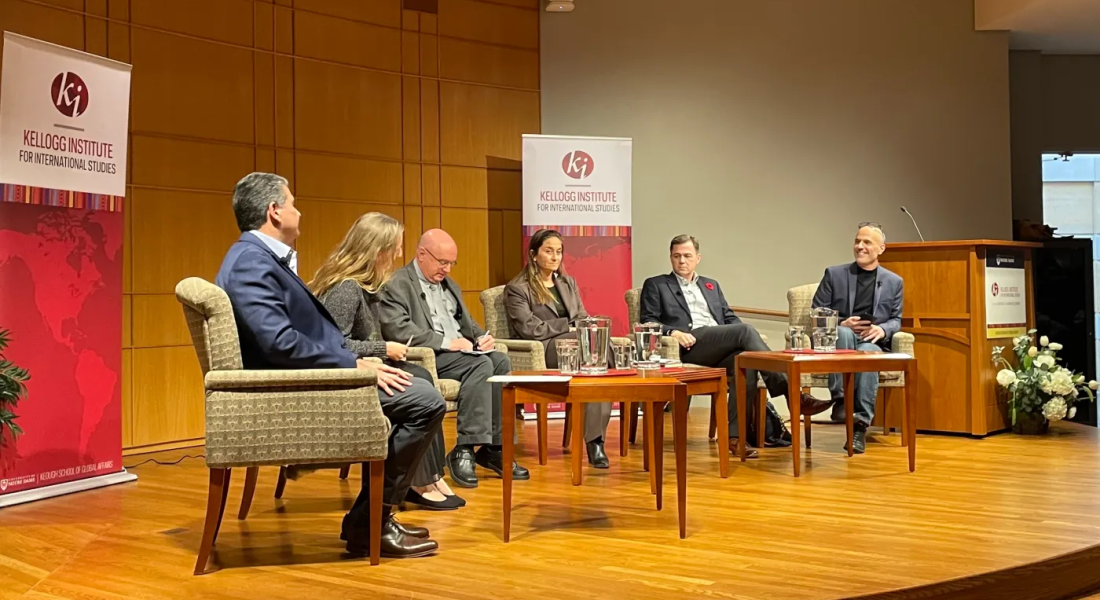
The Kellogg Institute of International Studies hosted a panel, “Global Democracy at Risk: Why it Matters and What Can be Done,” Thursday in the Hesburgh Center Auditorium. The five speakers included University professors, directors of democratic institutions, and foreign political figures.
The primary topic concerned democratic backsliding, which is the slow decline of democratic values and the rise of authoritarian elements with traditionally staunch democratic institutions across the globe.
The talk also addressed the University’s new democracy initiative and the role the Kellogg Institute played in its development. The event began with an introduction from Aníbal Pérez-Liñán, Kellogg Institute director.
“What is the state of democracy in the world? Why is democracy at risk becoming a problem multiplying across countries, across regions and across all levels of development nowadays? And perhaps more importantly, what can be done about this? This is the topic of our panel today,” Pérez-Liñán said.
Pérez-Liñán explained that each speaker represented a particular region or topic of interest, and each was allotted seven minutes to extrapolate on their position.
Jaimie Bleck, a political science professor and a faculty fellow with the Kellogg Institute, took the floor first. She spoke about motives behind a wave of authoritarianism in the Sahel region of Africa, which includes nine coups in seven nations over a three-year period.
Bleck cited a “tremendous imbalance” between presidential power and the other branches of government as one possible culprit for the recent uprisings.
“See, the military is one of the few forces that could check presidential power or could offer some type of counterbalance to the president,” Bleck said. “[This] leads many civilians to justify these coups.”
Bleck also drew an important distinction between procedural democracy – the type defined by the organization of formal government bodies and general elections – and democracy that produces substantive positive change for its citizens.
“The international community is so focused on elections. There’s a real emphasis on the procedural element of democracy. And yet there’s a willingness to overlook a lot of the other gaps in terms of accountability,” Bleck said.
The following speaker, Juan Sebastián Chamorro, focused on the political climate of South America.
Chamorro was a pre-candidate for the presidency of Nicaragua in 2021 before being detained along with a number of opposition candidates and other civic leaders. He was released from prison in February 2023 and traveled to the United States, where he is now a Kellogg visiting fellow.
Chamorro gave two reasons behind the degradation of democracy in countries like Guatemala and his home state of Nicaragua. The first was economic inequality and the second was organized crime.
“The majority of the population is underemployed, undereducated and undernourished. So it’s really hard to build a healthy democracy in such conditions,” he said.
Susan Ostermann, a global affairs professor, spoke about her area of expertise: democracies in the Indian subcontinent.
Ostermann expressed doubt in the strength of the formal institutions within India, and she listed a few cracks in the democratic framework, including the annexation of Kashmir. The abrogation of a law supporting Kashmiri autonomy resulted in the shutting down of press freedom, the shutting off the internet and the putting of people into a complete state of lockdown, according to Ostermann.
The penultimate speaker was David Campbell, director of the Notre Dame Democracy Initiative. Campbell spent his time promoting the initiative, which is one of three that the University has founded as part of its faculty-led Strategic Framework. The others are the Initiative on Poverty and the Initiative on Ethics.
Campbell said the goals of his initiative are studying democracy, sustaining democracy and promoting democracy in a place for convening important global discussions.
Scott Appleby, dean of the Keough School of Global Affairs, capped the evening by stressing how Notre Dame promotes democracy as an institution of higher education. He also advocated for a reinvigoration of studies on the political climates of all nations in order to stave off future trends toward anti-democratic regimes.
Appleby said, “If Notre Dame over the next decade is to become the pre-eminent center for the study and repair of democracy in the United States and around the world, we can and must think, within disciplines, across disciplines and beyond disciplines.”
This story originally appeared in The Observer student newspaper.
The Kellogg Institute for International Studies, part of the Keough School of Global Affairs at the University of Notre Dame, is an interdisciplinary community of scholars and students from across the University and around the globe that promotes research, provides educational opportunities, and builds partnerships throughout the world on the themes of global democracy and integral human development.





